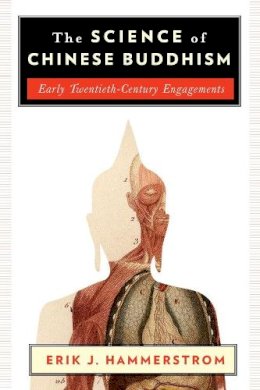
Stock image for illustration purposes only - book cover, edition or condition may vary.
The Science of Chinese Buddhism: Early Twentieth-Century Engagements
Erik J. Hammerstrom
€ 67.52
FREE Delivery in Ireland
Description for The Science of Chinese Buddhism: Early Twentieth-Century Engagements
Hardback. Series: The Sheng Yen Series in Chinese Buddhist Studies. Num Pages: 264 pages. BIC Classification: 1FPC; 3JJ; HRAM3; HRAX; HRE. Category: (P) Professional & Vocational. Dimension: 240 x 161 x 23. Weight in Grams: 490.
Kexue, or science, captured the Chinese imagination in the early twentieth century, promising new knowledge about the world and a dynamic path to prosperity. Chinese Buddhists embraced scientific language and ideas to carve out a place for their religion within a rapidly modernizing society. Examining dozens of previously unstudied writings from the Chinese Buddhist press, this book maps Buddhists' efforts to rethink their traditions through science in the initial decades of the twentieth century. Buddhists believed science offered an exciting, alternative route to knowledge grounded in empirical thought, much like their own. They encouraged young scholars to study subatomic and relativistic physics while still maintaining Buddhism's vital illumination of human nature and its crucial support of an ethical system rooted in radical egalitarianism. Showcasing the rich and progressive steps Chinese religious scholars took in adapting to science's rising authority, this volume offers a key perspective on how a major Eastern power transitioned to modernity in the twentieth century and how its intellectuals anticipated many of the ideas debated by scholars of science and Buddhism today.
Product Details
Publisher
Columbia University Press
Format
Hardback
Publication date
2015
Series
The Sheng Yen Series in Chinese Buddhist Studies
Condition
New
Weight
489g
Number of Pages
264
Place of Publication
New York, United States
ISBN
9780231170345
SKU
V9780231170345
Shipping Time
Usually ships in 15 to 20 working days
Ref
99-15
About Erik J. Hammerstrom
Erik Hammerstrom is assistant professor of East Asian and Comparative Religion at Pacific Lutheran University in Tacoma, Washington. With Gregory Scott, he cofounded the Database of Modern Chinese Buddhism.
Reviews for The Science of Chinese Buddhism: Early Twentieth-Century Engagements
Using science as an ideological marker of modernity, Hammerstrom presents an astute discussion of the ongoing relationship, rhetorical and otherwise, between various understandings of Buddhism and science.
David McMahan, Franklin & Marshall College Through impeccably conducted research, Hammerstrom provides a sorely needed comprehensive history of how Chinese Buddhists shaped their own scientific epistemology.
Rebecca Nedostup, Brown University Hammerstrom contributes to the ongoing study of science and religion by giving us a view of their relationship from a non-Western perspective. Utilizing newly available archives of Buddhist periodicals, he shows that early twentieth-century Chinese Buddhists had different issues with science than those that routinely vex Western religions. The Science of Chinese Buddhism provides a wide field of previously unavailable data that will expand the theoretical conversation for many years to come.
Charles B. Jones, Catholic University of America Erik Hammerstrom masterfully reveals the ways Chinese Buddhist intellectuals of Republican China reconfigured Buddhism to make it compatible with science and modernity, as well as argued for Buddhism's superiority to them. With fascinating stories and a meticulous analysis, Hammerstrom's book is a must-read for anyone seeking to understand Buddhism's makeover as the paradigm of science dawned over East Asia.
Hwansoo Ilmee Kim, Duke University [The Science of Chinese Buddhism] breaks new ground... Hammerstrom's scholarship is detailed and thorough... Recommended. Choice An important work that will be used and cited for a long time to come. Religious Studies Review
David McMahan, Franklin & Marshall College Through impeccably conducted research, Hammerstrom provides a sorely needed comprehensive history of how Chinese Buddhists shaped their own scientific epistemology.
Rebecca Nedostup, Brown University Hammerstrom contributes to the ongoing study of science and religion by giving us a view of their relationship from a non-Western perspective. Utilizing newly available archives of Buddhist periodicals, he shows that early twentieth-century Chinese Buddhists had different issues with science than those that routinely vex Western religions. The Science of Chinese Buddhism provides a wide field of previously unavailable data that will expand the theoretical conversation for many years to come.
Charles B. Jones, Catholic University of America Erik Hammerstrom masterfully reveals the ways Chinese Buddhist intellectuals of Republican China reconfigured Buddhism to make it compatible with science and modernity, as well as argued for Buddhism's superiority to them. With fascinating stories and a meticulous analysis, Hammerstrom's book is a must-read for anyone seeking to understand Buddhism's makeover as the paradigm of science dawned over East Asia.
Hwansoo Ilmee Kim, Duke University [The Science of Chinese Buddhism] breaks new ground... Hammerstrom's scholarship is detailed and thorough... Recommended. Choice An important work that will be used and cited for a long time to come. Religious Studies Review
